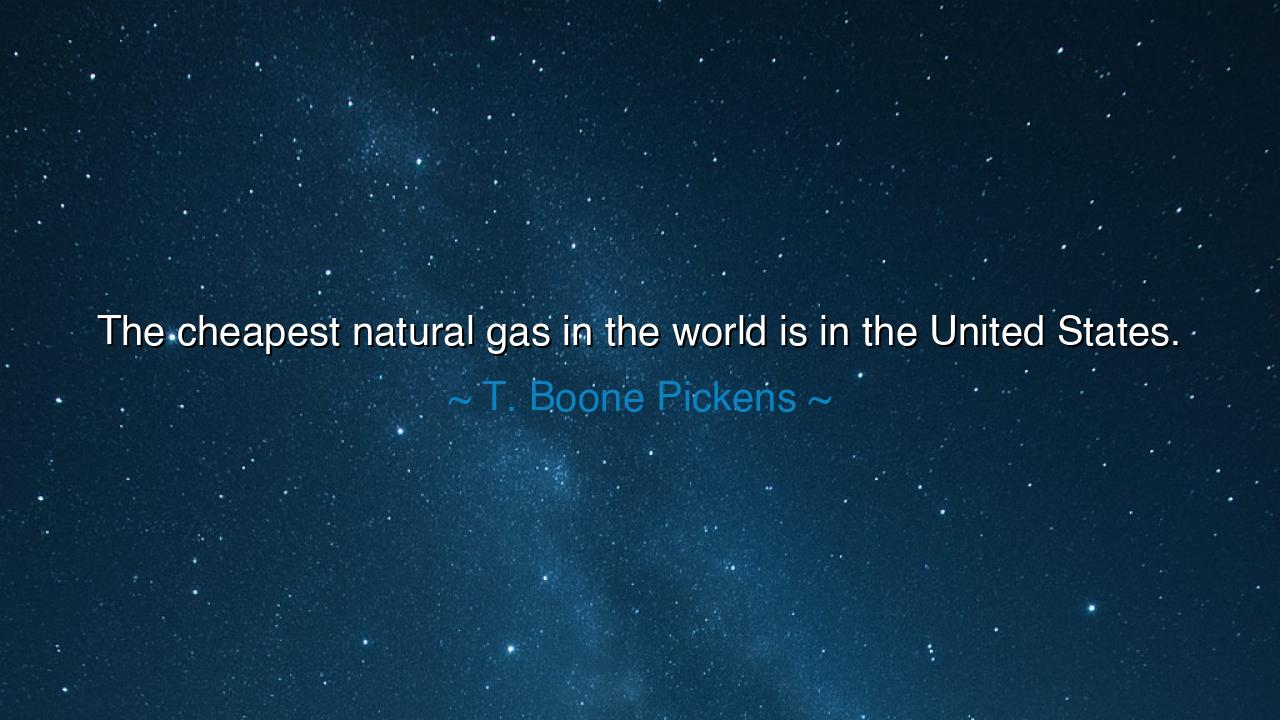
The cheapest natural gas in the world is in the United States.






Hear the oilman’s blunt proverb, hammered like a stake into the shale: “The cheapest natural gas in the world is in the United States.” In this stark line, T. Boone Pickens marries geology to markets and turns a balance sheet into a banner. The saying is not poetry for its own sake; it is a compass point from a man who spent a lifetime reading rock, rig, and rumor. He is telling us: here, beneath these plains and pine belts, pressure and patience conspired to stack vast reservoirs; and here, above them, drillers learned new arts—horizontal reach and slickwater fracture—to call those molecules to the surface at a price that humbled rivals. The sentence is a boast, yes, but also a diagnosis of power: where fuel is cheap and steady, industry gathers and policy bends.
To name cheapest is to speak of a moment when abundance outran demand, when the Henry Hub price grew as light as breath, and power plants, factories, and home furnaces turned their faces toward gas the way sunflowers turn to light. The road to that moment was long: decades of seismic maps, dry holes, bankruptcies, and stubborn tinkering; then the hinge—shale unlocked, laterals steered like underground calligraphy, sand and water driven into stone until it whispered release. In that hinge the proverb was born: a resource once dismissed as “stranded” became a river; scarcity stories gave way to a glut that redrew fuel-switch tables from coal to gas.
Mark a tale from those years. In a Midwestern town, a steel mill that had tasted mothballs stirred awake. Electricity bills fell as generators swapped coal for gas; heat for furnaces arrived steadier, cleaner; managers rehired crews and ordered new roll stands. The town’s diner refilled coffee for men who had stopped coming by. No politician could have decreed that resurrection; it was the arithmetic of cheap gas reaching the ledger of ordinary life. Trucks idled less; boilers fouled less; the sky over the river cleared a shade. Here, a commodity price became a parable.
Yet the sentence carries a shadow, as all bright sayings do. Cheapest can seduce us into thinking wisest. We learned that wells decline fast and fields must be drilled like drumbeats; that methane, if it slips unburned, warms the planet like a thief; that rivers and communities want more than royalties—they want respect. We learned that a grid built on a single comfort—price—can shiver when winter squeezes pipelines or when global cargoes chase richer bids. The oilman’s truth must be held with the farmer’s caution: windfalls are weather; stewardship is the climate.
What, then, is the marrow of Pickens’ claim? It is both invitation and warning. Invitation: use this United States fortune to buy time—retiring dirtier stacks, balancing wind and sun, electrifying heat and wheels while the bill stays bearable. Warning: do not mistake a good decade for a covenant. Markets turn; basins tire; the public’s patience thins when spills or flares write their own headlines. Cheapest natural gas is a tool, not a throne; a bridge, not a homeland. The wise cross bridges with eyes on the far shore.
History reminds us that cheap power has always scattered seeds and weeds together. Coal once wore the crown; it built railroads and blackened lungs. Oil seized the scepter; it shrank distance and entangled nations. Gas now stands in the court with a cleaner cloak, but not a spotless one. The choice is ours: let price lead us, or make price serve us. We can spend this bargain like sailors on shore leave, or invest it like elders who plant trees in whose shade they will not sit.
Let the lesson be set down plainly for heirs and neighbors. Use the dividend, don’t worship it. While natural gas lowers bills and emissions at the smokestack, build the next lattice: efficiency first; renewables stitched tight with storage; modern wires and rules that reward flexibility and honesty; methane kept on a short leash, measured and managed until leaks are exception, not norm. Communities rich in rigs should be richer in schools, health, and water protection; royalties should outlast the last load-out. In boardrooms and kitchens alike, ask not “Is it cheapest today?” but “Does it keep us whole tomorrow?”
And carry these actions like tools at dawn: (1) Measure and mend methane—find leaks, fix fast, publish results. (2) Retire coal with grace—use cheap gas to cut the dirtiest stacks while building wind, solar, and storage that will one day shoulder the load. (3) Hedge the future—long-term contracts for reliability, diversified portfolios for resilience. (4) Invest the surplus—grid upgrades, weatherization, workforce training that outlives any boom. (5) Honor the land—best-practice drilling, steel-true casing, clean water plans written with the community, not merely shown to it. Do this, and Pickens’ blunt banner becomes a wise banner: the cheapest natural gas in the United States as a bridge well-walked—toward a sturdier house where price, planet, and people can dwell without debt to one another.






AAdministratorAdministrator
Welcome, honored guests. Please leave a comment, we will respond soon